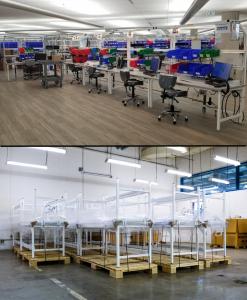Will Today's Supply Chain Disruptions Bring Manufacturing Back to the USA?
Supply chain disruptions are driving companies to reshore their manufacturing supply chains. Find out how this trend affects your business.
After many years of arguing that international trade (and overseas production) was the best way to maximize company profits, many economists now see supply chain disruptions as a major source of risk.”
AUSTIN, TEXAS, UNITED STATES, October 8, 2021 /EINPresswire.com/ -- Covid Has Disrupted Supply Chains, And It Could Get Worse— Formaspace
We’ve all seen the headlines.
Worldwide chips shortage has reduced car production lines to a standstill, with analysts projecting that the situation will continue well into 2022, with IHS Market estimating that automakers will produce 10.6 million fewer vehicles in 2021 due to the chip shortfall.
Leading American retailers such as Costco report that the cost of shipping a container from Asia to the US has increased by as much as 6x, causing major retail companies, including Costco, Home Depot, Target, and Walmart, to charter their own container ships.
But chartering ships may not be enough to solve all the supply chain issues, as cargo ships remain stalled in waters outside key US ports on both the East and West coast, waiting for overwhelmed port, rail, and trucking firms to transfer the goods.
Increasing demand for fuel and transportation bottlenecks are hitting the UK especially hard; record natural gas prices and gasoline shortages threaten industrial production and economic activity.
And analysts point to a potential further supply chain collapse, which could seriously damage the world economy as it struggles to recover from the Coronavirus pandemic.
Wouldn’t It Be Better If We Made Things Close To Home?
Until last year, the concept of a “supply chain” was virtually unknown outside the world of company executives and logistics, procurement, and distribution management professionals.
But supply chain disruptions during the height of the Coronavirus lockdown last year brought the issues home for a wide swath of the public – who became increasingly frustrated at the inability to buy staples such as toilet paper and baby wipes.
At the same time, healthcare providers (and other essential workers) could not find enough PPE (such as N-95 masks) or medical equipment (such as ventilators for Covid patients in the ICU) — which are now primarily manufactured overseas.
In the public’s mind, this desperate situation had one root cause — we are too dependent on overseas production – leading to an outcry that our public health and safety depends on returning to make critical items (especially PPE, medicines, and medical equipment) here at home.
Company Executives Coming Around To Seeing Benefits Of Reshoring Supply Chains And Manufacturing Operations
Public sentiment doesn’t always translate into action, however.
There’ve been many public awareness campaigns in the past (“Look for the Union Label” anyone?) that sought to pressure companies to produce goods in the USA — but to little avail.
However, things seem to be different this time.
An executive survey of manufacturing executives conducted by Thomas in March 2021 reports a sharp increase (from 54% to 85%) since the start of the pandemic in the number of companies that they are “likely,” “very likely,” or “extremely likely” to want to reshore their supply chains by replacing overseas producers with domestic sources.
This is a big change from before the pandemic.
According to the report, the top seven products or services that companies want to source domestically are:
- Metals and Metal Products
- Fasteners, Gaskets, or other Hardware
- Packaging Materials
- Electrical or Electronic Components
- Machining Tools and Services
- Automation Technologies
- Assembly Services
Thomas also reports that manufacturing companies are motivated by changing cost structures (making overseas imports more expensive) and a desire to reduce exposure to shipping cost fluctuations and disruptions.
(This uncertainty is also having a big impact on JIT (Just in Time) manufacturing, as automobile manufacturers reluctantly admit they cannot maintain predictable minute-by-minute parts deliveries needed to maintain the near-zero parts inventories which JIT manufacturing demands.)
Economists Point To A Potential Economic Growth Upside Bonus To Reshoring
Economists, too, are changing their tune.
After many years of arguing that international trade (and overseas production) was the best way to maximize company profits, many economists now see supply chain disruptions as a major source of risk.
Candace Browning, Head of Bank of America’s Global Research team, points out that the cost of reshoring once seemed too expensive – that is before Covid. The bank’s analysts found that among the 3,000 global companies it follows, more than 80% experienced supply chain disruptions during the pandemic, and three-quarters of those companies are now looking into reshoring. Companies appear willing to absorb higher costs in favor of reducing supplier uncertainty and transport risks.
Read more...
Julia Solodovnikova
Formaspace
+1 800-251-1505
email us here
Visit us on social media:
Facebook
Twitter
LinkedIn


